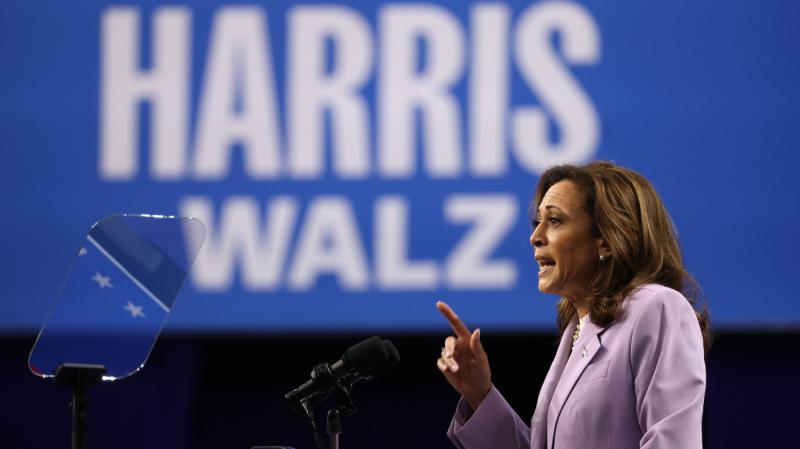After the 'joyful' convention, Harris needs to focus on the issues voters care most about
By: Adonis Hoffman (The Hill)


Well, yes, the 2024 election has become a competition of 'I's but that doesn't have anything to do with organic issues and concerns of the electorate. The battle of egos is thwarting any meaningful examination of policy details. And attempting to exploit the situation in a weak attempt to revive the neoliberal status quo cannot hide it's own cynicism.
If Federal interest rates were the problem with inflation then explain why consumer debt has exploded over the last 3 years. High interest rates are not supposed to result in rapidly expanding credit and debt. When the Fed finally lowers interest rates according to obsolete economic guidelines there may be a conflagration of new debt that could threaten to break the global economy. It really does appear that the artificial controls imposed (by the US and Europe) during the pandemic has broken the supply-side economy. The developing economies around the world may become the winners simply because they've been too small to matter.
Immigration isn't difficult to fix. Build the damned wall and then move on to reforms. It's not rocket science; the flood cannot be stemmed while the dike is broken. Yes, replenishing the ranks of the poor with immigrants does allow political point scoring for improving lifestyles. But attempting to revitalize the middle class by importing impoverished people only provides a cynical political advantage. Ultimately the social benevolence of the American people will become so over exploited that any sort of progress can only become transactional. We'll end up bankrupting the country just to score contrived political points.
Israel exists as reparations to assuage the generational guilt of western, middle, and eastern Europe. The United States doesn't share that generational guilt. The creation of Israel didn't cost Europe anything. So, why should the United States bear the burden of soothing Europe's guilt over its dark past? Doesn't Europe have any influence in the Middle East? There has never been a two state solution; that wasn't Europe's concern then or now. And over the decades the Palestinians have bluntly stated they are not interested in a two state solution. The other Arab countries in the Middle East don't seem to care one way or another. Why must the United States continue to bear the risks and burdens of a two state solution that no one else seems to want? Maybe it's time to just move on.

With the euphoria of the Democratic National Convention fading fast, Democrats must now face the fact that Americans care deeply about only a few key issues. All of the jubilation of the convention will not quench the body politic's thirst for clarity on bread-and-butter issues or matters of national importance.
The success of the Harris-Walz bid for the presidency will turn on how they handle three big issues, all beginning with the letter "I": inflation; immigration and Israel, and in that order.
Inflation requires a plan, not just a promise. It has been a thorn in the side of the current administration, which can otherwise claim a successful record of macroeconomic performance. And history shows that inflation is perhaps the one issue that can doom a presidency. Just ask Gerald Ford and Jimmy Carter, both one-term presidents plagued by poor inflation numbers
While there are many and varied factors for rising inflation that are outside the control of the White House, there is no doubt that Fed policy is central to its control. And it is there where VP Harris will be challenged.
If Bill Clinton is the ultimate "explainer in chief", then Harris must become the ultimate "executor in chief" for fixing Fed policy and interest rates. From the basic cost of borrowing to the cost of goods, Harris must implement economic policies that do not involve price-fixing, even where market abuses occur.
Immigration requires action, not just accusations. And while both Harris and former President Trump have traded barbs and bragging rights over who has spent more time at the border, success must be measured by the results.
That means Democrats not only have to reconstruct the bipartisan border bill that was derailed by Trump, they have to build it back better. The challenge for Harris, in a very short time, is to lay the foundation for an omnibus immigration measure that checks all the boxes — security, asylum, enforcement and more.
Harris's plan must involve enough direct action that it gives the affected border and swing states no other option but to agree. In that sense, the erstwhile bipartisan compromise should be considered a floor, not a ceiling, with buy-in from law enforcement and communities on the ground.
Third, when it comes to American foreign policy, Israel requires a strategy, not just a slogan.
For decades, U.S. policy toward Israel has been steadfast. Politicians across the spectrum, save for the radical fringe, agree that Israel must be secure, and that Israel's right to defend itself is unequivocal. Most also agree that the Palestinian people deserve the right to freedom and self-determination.
After that, things get dicey for even the most ardent and well-intentioned proponent of Middle East peace and security.
The war in Gaza has complicated an already complex situation, beginning with the atrocity of October 7 and continuing with the mass casualties of civilians today. Under any administration, resolution of the Israeli-Palestinian issue is challenging.
Successive American presidents from Reagan to Biden have worked arduously for peace, and all have fallen short of glory.
Bush I convened the Madrid Conference in 1991. Clinton organized the Oslo Accords and the Israel-Jordan Peace Treaty. George W. Bush endorsed the two-state solution. Barack Obama designated a special envoy to the Middle East and furthered two-state talks.
Trump successfully brokered the Abraham Accords to normalize Middle East relations with Arab states, including the United Arab Emirates, Bahrain, Sudan and Morocco, although the Accords did not address the Israeli-Palestinian issue.
And the Biden administration, despite sustained effort, struggled to find its footing amid the changing sands of armed conflict and political chaos in the region, much of it brought on by destabilization efforts of Iran and its terrorist proxies. Domestic pressure from the left has not made things any easier or less complicated.
Against this backdrop and with this history, Harris will be challenged to chart a new course — a course that balances the competing American interests of unwavering support for Israel on the one hand and unambiguous support for human rights on the other.
If her acceptance speech is any indication, Harris may be up to the task. If elected, however, she must move decisively beyond the sorties of the past and the slogans of today.
More importantly, Harris must forego the "joy" and historicity of the moment in favor of the hard work of solving today's problems — problems all Americans care deeply about, and solutions that could determine her future and that of this nation.
Adonis Hoffman writes on business, law and policy. He previously served in senior roles in the U.S. House of Representatives and as an adjunct professor at Georgetown University.

Tags
Who is online
52 visitors


The Democrats' two biggest 'I's that were to be the centerpiece of their campaign were supposed to be Insurrection and Infanticide. Biden was going to win on anti-Trump and abortion. Remember?
Focusing attention on Inflation, Israel, and Immigration kinda means that Trump has won the debate on issues. Is Democrats' desperation really so deep that they must become Reagan Republicans?